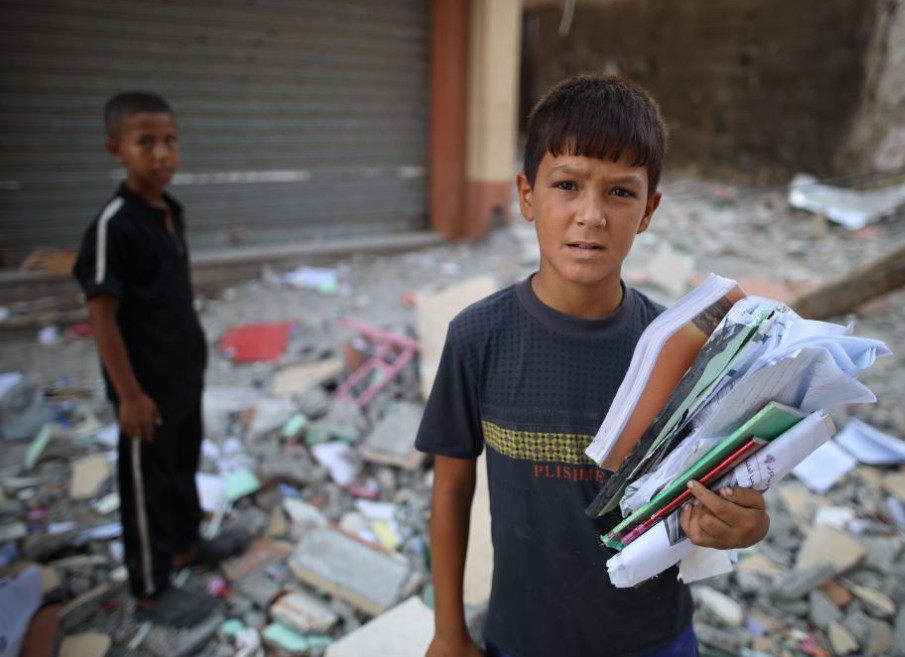
UNITED NATIONS – Despite Gaza’s deadly violence and several recent Israeli evacuation orders further disrupting aid operations, the head of UN security said on Tuesday that relief deliveries are continuing.
“The United Nations is determined to stay in Gaza to deliver life-saving aid for and with Palestinian civilians,” said Gilles Michaud, the undersecretary-general for safety and security. “Humanitarian aid delivery continues — a tremendous feat given that we are operating at the upper-most peripheries of tolerable risk.”
Michaud said that humanitarians have been in the crosshairs throughout the crisis, “by far the deadliest on record for the UN.”
He called the several recent mass evacuation orders the latest in a long list of unbearable threats to the UN and humanitarian personnel.
“Like most Palestinians in Gaza, we are running out of safe spaces for our own staff,” Michaud said. “The timing could hardly be worse, with the start of a massive polio vaccination campaign scheduled for next week, for which large numbers of staff will need to enter the (Gaza) Strip.”
He said the Israeli Defense Forces’ series of evacuation orders this past weekend compound existing security threats and seriously impact the pace of safe aid deliveries.
“These constraints are beyond our control,” the undersecretary-general said.
The UN Office for the Coordination of Humanitarian Affairs (OCHA) said that they could distribute some tents as temporary shelters in response to the evacuation orders on Monday. However, the stock is running low and limited.
OCHA said the World Food Programme (WFP) staff had to relocate to other UN premises, leaving behind their offices and guest houses in Deir al Balah. Despite these challenges, the agency continues to deliver food assistance.
“In addition to the loss of warehouses and other humanitarian premises due to evacuation orders, it remains difficult to move around the south of the Gaza Strip due to the severe overcrowding and continuous displacement,” OCHA said.
The office said access of UN humanitarian partners to northern Gaza is particularly challenging as it requires coordination with the Israeli authorities and passage through an internal checkpoint.
OCHA said plans to fuel hospitals in the north of Gaza have now resulted in access being denied five times in the past week, leaving some hospitals without new provisions for fuel for over 10 days. The dependency on fuel to run backup generators is complete, as the Israeli authorities cut electricity provision from the Gaza Strip back in October.
Following the delivery of polio vaccines into Gaza, UN staff on the ground are now positioning them in 11 health centers. Beginning this weekend, they are training over 1,000 medical workers and volunteers to participate in the campaign.
Also, Stephane Dujarric, chief spokesman for UN Secretary-General Antonio Guterres, attempted to counter some disinformation about the vaccine being administered.
“The safest and the most effective way to protect children against the polio virus, regardless of the variant, is to vaccinate them,” Dujarric told reporters at a regular briefing. “This vaccine is safe. It is effective and it offers top-quality protection. It is a vaccine globally recommended for variant type 2 poliovirus outbreaks by the World Health Organization.”
He said that since 2021, more than 1.2 billion vaccine doses have been used to protect children in over 40 countries.
The spokesman said the UN Children’s Fund, the UN relief agency for Palestine refugees, known as UNRWA, and the World Health Organization plan to roll out the campaign in Gaza this weekend. It will be done in two rounds, each consisting of two drops of oral polio vaccine type 2, for more than 640,000 children under 10 years of age, to reach at least 95 percent of the children in each round.